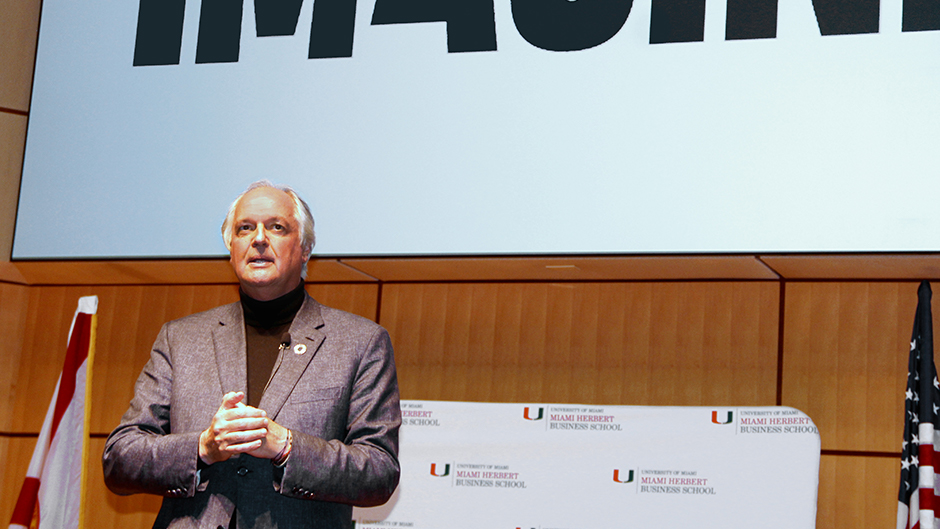In a meeting with students in the Master’s of Science in Sustainable Business program and at a public forum on Tuesday, the former CFO of Nestle and CEO of Unilever said business leaders need to practice more “purpose-driven leadership” and collaborate across industries to embrace sustainable development goals because they are good for the planet and foster financial success.
Following decades as a successful executive, Paul Polman last year founded Imagine, a company and foundation that mobilizes business leaders across industries to work together to promote sustainable goals, notably the 17 sustainability development goals promoted by the United Nations.
“Paul Polman, as CEO of Unilever for 10 years, showed how the pursuit of sustainable business, shared prosperity, and long-term purpose all enhance shareholder value,” said John A. Quelch, dean of the University of Miami Patti and Allan Herbert Business School. “These ideas are central to Miami Herbert’s mission to educate principled leaders.”
Named to lead the consumer goods firm Unilever in 2009, Polman spent the next decade shifting the workplace and redirecting strategies to improve its social impact and lessen its environmental footprint. Unilever met its goals for diversity and inclusion—with women filling 50 percent of upper management positions at offices around the world—while generating growth for eight consecutive years.
“The boundaries that we place on people drive their behavior,” said Polman, noting that the global economy today is flush with financial capital and short on environmental and social capital. He urged four transformative goals to reverse the trend toward increased conflict and destabilization: for financial markets to adopt longer-term focus, decarbonize the global economy, ensure circular or regenerative economies, and to promote economic growth that is more inclusive.
Teddy L’houtellier, sustainability manager at the University of Miami, joined students for a meeting with Polman.
“Coming from someone who’s been at the head of a major corporation for 10 years and who’s done a lot of these changes and been fighting this fight make his message that much more powerful,” L’houtellier said. “As he said in his lecture, everyone sees and knows that governments alone, NGOs alone, and citizens alone, can’t make the necessary changes. We need to have the corporations on board.”
L’houtellier said that Polman’s messages and goals “really resonate with much of what we’re doing here at the University, and his call for ‘collective courage’—for business leaders to come together across industries to support change together—is really mind-changing and makes sense.”
Polman shared his vision for new business leaders in a talk that was part of the Miami Herbert Business School’s Cobb Leadership Lecture Series.

